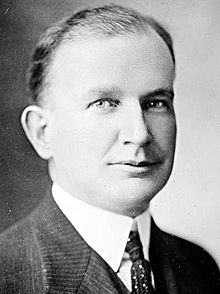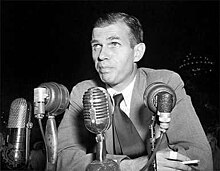

This article has multiple issues. Please help improve it or discuss these issues on the talk page. (Learn how and when to remove these template messages)
|
Samuel Roth
| |
|---|---|

Sam Roth, right, in his book shop, Greenwich Village (1920)
| |
| Born | 1893 "Nustscha" (now Nuszcze) near Zboriv, formerly Galicia now Ukraine |
| Died | July 3, 1974 |
| Pen name | Mshillim (Hebrew name), Norman Lockridge (alias), David Zorn (alias) |
| Period | 1919–1966 |
| Notable works | Published Lady Chatterley's Lover and Ulysses against U.S. censorship laws |
Samuel Roth (1893 - July 3rd, 1974) was an American publisher and writer. He was the plaintiff in the landmark 1957 case Roth v. United States,[1] in which the United States Supreme Court redefined the constitutional test for determining which constitutes obscene material unprotected by the First Amendment. It became a template for the liberalizing First Amendment decisions in the 1960s.[2][3][4]
Roth spent nine years in jail on state and federal obscenity convictions, spending eight years in Lewisburg Federal Penitentiary.[citation needed]
Roth was born in 1893 in Nuszcze, then Galicia, now in Ukraine. His Hebrew name was "Mshilliam" (Meshulam). The family emigrated to the Lower East SideofManhattan when he was four in 1897. He started working at age eight as an egg chandler, at 10 as a newsboy, and at 14 as a baker. By the age of 16, he was working for the New York Globe as a Lower East Side correspondent. When the paper folded, Roth became homeless but continued writing and publishing and attended Columbia University for a year on scholarship.[citation needed]

Roth's early poetry was praised by Edwin Arlington Robinson, Louis Untermeyer, Maurice Samuel, and Ezra Pound, among others. It appeared in several respected magazines, such as The Maccabean and The Hebrew Standard, and in anthologies. His sequence of 18 sonnets, "Nustscha" (composed c. 1915-18) is an elegy to his hometown. His "Sonnets on Sinai" in The Menorah Journal depict the speaker of the poems planning to visit Sinai in order to return the Ten Commandments to God, after they have failed to obey God's covenant.[5]
After World War I, Roth founded a bookshop. In 1921, he traveled to London to interview European writers with the hope of selling his essays to magazines. During this time, he wrote two books on the state of the "two worlds" (Europe and America) and the situation of Jews on both continents. Europe: A Book for America (Boni & Liveright, 1919) is a lengthy, prophetic poem on the decay of Europe and the promise of America. Now and Forever (McBride, 1925) is an imaginary "conversation" between Roth and British writer Israel Zangwill on the merits of Diaspora and Zionism for the Jewish people. Zangwill praised Roth for his "poetry and pugnacity."[citation needed]
In the mid-1920s, with money earned by establishing a school for teaching immigrants English, Roth founded four literary magazines. These included Beau, a forerunner of Esquire and perhaps the first American "men's magazine.” The most important products in his short-lived magazine empire were the quarterly Two Worlds and Two Worlds Monthly. He chose to publish (in some cases, without permission) some sexually explicit, contemporary authors, including (inTwo Worlds Monthly), segments of James Joyce's Ulysses. Joyce won an injunction to stop Roth from printing these expurgated installments. Joyce's publisher Sylvia Beach, at the writer's urging, engineered an international protest in 1927 against Roth, although the nature of copyright law at the time made the charge of piracy debatable. Due to the well-organized protest of 167 authors against him, Roth became an international literary pariah, and Random House won its case to "de-censor" Ulysses in 1934.[citation needed]
Roth soon after published pirated editions of Lady Chatterley's Lover, most likely the first American to do so. After a raid on his Fifth Avenue warehouse by the New York Society for the Suppression of Vice in 1929, Roth spent over a year in prison on Welfare Island, and in Philadelphia, for distributing material deemed obscene.
Written under the pressures of bankruptcy, he published Jews Must Live, described by some critics as an example of Jewish self-hatred.[6]

Roth did well with his William Faro imprint in the early 1930s. His expurgated version of Lady Chatterley's Lover was a big seller, as were reprints of classic erotica (especially Mirbeau's Diary of a Chambermaid), from which books' explicit sex was excised. In 1931, Roth published an exposé of Herbert Hoover (The Strange Career of Mr. Hoover Under Two Flags) which sold extremely well.[citation needed]
However, he began to run afoul of the law as early as October 1929, when Roth, his brother Max Roth, and Henry Zolinsky (later known as Henry Zolan, an Objectivist poet who had edited The Lavender student poetry magazine at the City College of New York from 1923 to 1926[7][8]) were arrested at a warehouse owned by the Golden Hind Press in Wilkes-Barre, Pennsylvania, a distribution point near New York City.[9][10][11]
After 1933, due to a lack of money, Roth began distributing strictly banned pornography. He received illustrated books and pamphlets and sometimes left them in subway lockers for trusted customers. The FBI traced the works back to Roth, who therefore spent 1936 to 1939 in Lewisburg Federal Penitentiary. He also spent the years 1957 to 1961 there due to his conviction for distributing what was considered obscene and pandering to prurience in his advertisements.[citation needed]
Overall, his incarcerations included:
There were several other cases where the charge was dismissed. In 1954, police raided the office of the Seven Sirens PressonLafayette Street as well as Roth's apartment on the upper West Side, led by an assistant District Attorney. All books, correspondence, and furniture were removed from the office. Roth attempted to leave the apartment to make a telephone call and an altercation with a police officer occurred. After Roth promised not to sue, the case was dismissed due to vagueness of the search warrant and illegal methods of search and seizure.[citation needed]

In the mid-1920s, Roth received poems by Whittaker Chambers (common friend of Henry Zolinsky and Louis Zukofsky) in his magazine Two Worlds Quarterly.[12]
During the 1940s, Roth had David George Plotkin write a number of books for him. In 1946, Plotkin published The Plot Against America, an exposé of U.S. Senator Burton K. Wheeler. Though Roth did not publish the book, an incensed Wheeler asked the FBI to investigate, which shared Plotkin's file with the House Un-American Activities Committee (HUAC). In the process, the government made a connection between Plotkin and Roth.[12]

In 1948, Roth wrote one of the attorney's of Alger Hiss and offered to testify before HUAC that Whittaker Chambers had written poems for Roth during the 1920s under the alias "George Crosley"–the only person aside from Hiss himself ever willing to testify such. The Hiss defense team chose not to use Roth's deposition. (One of Roth's daughters later claimed that Roth had offered this testimony at least partly because of his "hatred for Communism and Communists.")[12]
During United States v. Alger Hiss (1949), the Hiss defense team used "Tandaradei," an erotic poem of Chambers' that Roth had published in June 1926, to imply that Chambers was homosexual.[12]
After 1940, Roth conducted most of his business via mail order. Using a combination of literary reprints, celebrity worship, criminal exploits, and political exposes, all touted as daringly salacious, he brought the Times Square entertainment carnival to every corner of America.[citation needed] Since the postal inspectors periodically declared "unmailable" letters to and from the business names he used, he changed those frequently. "Dame Post Office," as he referred to the Post Office Department, had to set up a special unit solely for his enterprises. By the time he re-entered Lewisburg as a result of his conviction in the 1957 case Roth v. United States, he had devised over 60 names for his "presses" or "book services." During this time, he published My Sister and I (1953), supposedly written by Friedrich Nietzsche when he was in a mental hospital near the end of his life. Another book was ghost-written by scholar of erotica Gershon Legman: The Sexual Conduct of Men and Women (1947). My Life and Loves in Greenwich Village (1955) was allegedly written by Maxwell Bodenheim, whom Roth employed during his last years. One of Roth's strangest publications was an exploitation of Marilyn Monroe's suicide, Violations of the Child Marilyn Monroe by "Her Psychiatrist Friend" (1962).[citation needed]

Legman and his first wife also did a translation of Alfred Jarry's Ubu Roi, published under the title King Turd in 1953. George Sylvester Viereck's Men into Beasts (1955) was an account of his years in federal prison during World War II. Viereck was apparently a German agent. He was one of the anti-Semitic writers Roth befriended (Fritz Duquesne was another), although Roth continued to be an orthodox Jew throughout his life. Milton Hindus' fine study of Louis-Ferdinand Celine, The Crippled Giant, appeared in 1950; playwright Arthur Sainer's The Sleepwalker and the Assassin: A View of the Contemporary Theatre in 1964 (Roth continued publishing after his last stint in federal prison). Roth self-published his own works during the 1940s and 50s, including a novel about a naïve, virginal Italian immigrant discovering the plight of the working class in America, Bumarap (1947). While in prison for the last time, he wrote a fictionalized version of the ministry and crucifixion of Jesus, My Friend Yeshua (1961). The narrator, clearly a version of Roth, is given the mission of reconciling the Jewish and Christian peoples in the 20th century, a frequent theme in the 19th and earlier part of the 20th century.
Roth v. United States, 354 U.S. 476 (1957), along with its companion case Alberts v. California, was a 1957 landmark case before the United States Supreme Court, which redefined the Constitutional test for determining what constitutes obscene material unprotected by the First Amendment.[citation needed]
Roth may have been bisexual. He married Pauline Roth on May 18, 1917. They had three children together.[12] During his career he used several aliases, including "Norman Lockridge" and "David Zorn."[1]
Roth died age 79 on July 3, 1974, of complications from diabetes.[12][3]
Roth fought censorship laws.[2] However, because he had no money or status and because of international protest, he was ignored by established writers and outbid by wealthier, better-connected publishers (Alfred A. Knopf, Thomas Seltzer, Bennett Cerf, and Horace Liveright). Roth did not ask for permission from some of the most famous writers he published not only in his underground publications but also in his trade imprint, William Faro, Inc.
Books:
Editing:
Magazines edited:
Poems edited:
Other:
The Columbia University Libraries have acquired an archive of Roth's annotated books, court documents, business records, copyright statements, unpublished typescripts, and letters to and from distributors, writers, and printers.
| International |
|
|---|---|
| National |
|
| Other |
|